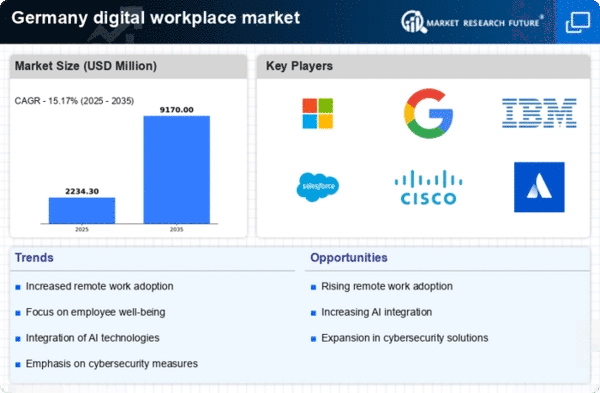Focus on Data-Driven Decision Making
The digital workplace market in Germany is increasingly characterized by a focus on data-driven decision making. Organizations are leveraging analytics and business intelligence tools to gain insights into employee performance, project outcomes, and operational efficiency. This trend is indicative of a broader shift towards evidence-based management practices, which can enhance strategic planning and resource allocation. The digital workplace market is responding by developing solutions that provide actionable insights, enabling companies to make informed decisions that drive growth and innovation. As data becomes a central component of workplace strategy, the demand for analytics tools is expected to rise significantly.
Growing Demand for Remote Work Solutions
The digital workplace market in Germany experiences a notable surge in demand for remote work solutions. As organizations increasingly recognize the benefits of flexible work arrangements, the market is projected to grow at a compound annual growth rate (CAGR) of approximately 12% over the next five years. This shift is driven by the need for enhanced employee productivity and satisfaction, as well as the desire to attract top talent. Companies are investing in tools that facilitate collaboration and communication among remote teams, thereby transforming traditional workplace dynamics. The digital workplace market is adapting to these changes by offering innovative solutions that cater to the evolving needs of businesses and their employees.
Investment in Digital Skills Development
The digital workplace market in Germany is witnessing a significant investment in digital skills development. As technology continues to evolve, organizations recognize the necessity of equipping their workforce with the skills required to navigate digital tools effectively. Reports suggest that companies that invest in employee training can achieve a return on investment (ROI) of up to 30% through improved efficiency and innovation. This focus on skills development is driving the digital workplace market to create tailored training programs and resources that empower employees to leverage digital tools, thereby enhancing overall organizational performance.
Integration of Advanced Collaboration Tools
The integration of advanced collaboration tools is a key driver in the digital workplace market. As teams become more dispersed, the need for seamless communication and collaboration has never been more critical. The market is seeing a rise in demand for platforms that offer real-time collaboration features, such as video conferencing, document sharing, and project management. This trend is expected to propel the digital workplace market forward, with estimates indicating that the market for collaboration tools could reach €10 billion by 2026. Companies are increasingly adopting these tools to enhance teamwork and streamline workflows, ultimately leading to improved business outcomes.
Emphasis on Employee Experience and Engagement
In the digital workplace market, there is a growing emphasis on enhancing employee experience and engagement. Organizations in Germany are increasingly aware that a positive work environment directly correlates with productivity and retention rates. Research indicates that companies focusing on employee engagement can see productivity increases of up to 20%. As a result, businesses are investing in platforms that foster collaboration, feedback, and recognition among employees. This trend is reshaping the digital workplace market, as providers develop solutions that prioritize user experience and engagement metrics, ultimately leading to a more motivated workforce.
















